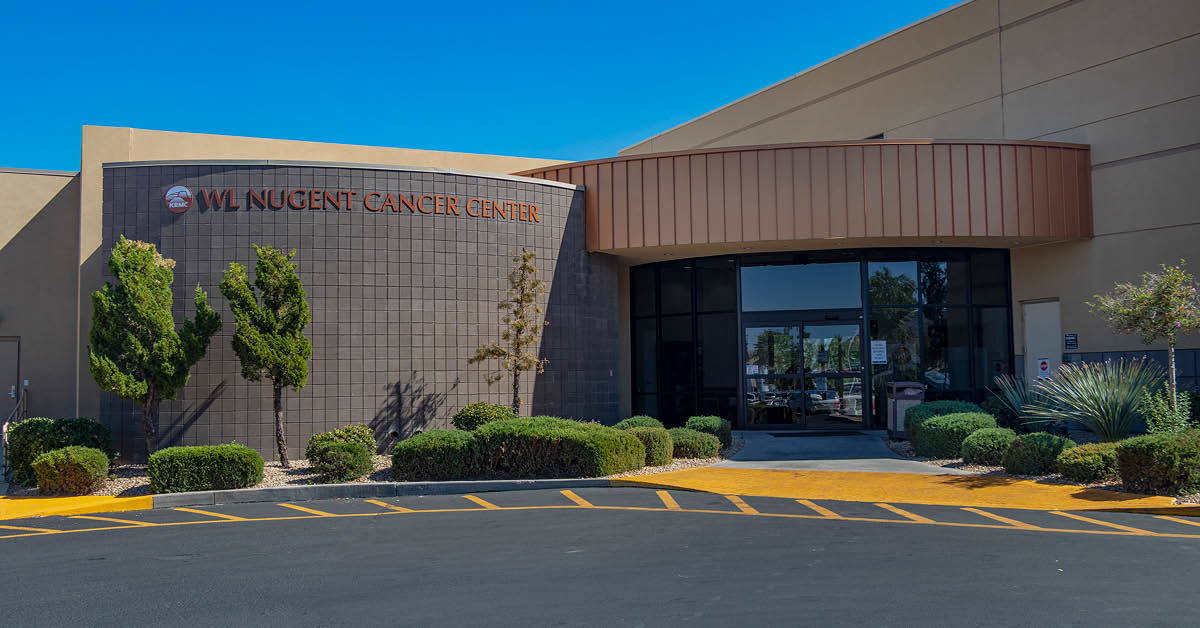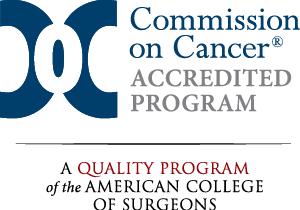Clinical Trials for Cancer Care
KRMC’s WL Nugent Cancer Center is the only cancer treatment center in Mohave County to offer clinical trials for cancer. Our facility is partnered with the National Cancer Institute’s Community Oncology Research Program (NCORP), a national network dedicated to bringing cancer clinical trials to people in their own communities.
What is a clinical trial?
Clinical trials are scientific studies that evaluate the effectiveness of new medical treatments, which can include:
• New drugs that have not yet been approved by the Food and Drug Administration (FDA)
• New uses for drugs that are already FDA-approved
• New technologies, such as a new type of radiation therapy
• New ways to combine treatments
After a new medical treatment is thoroughly tested for safety, a clinical trial is done to see how the treatment works on real patients. The patient's safety is the top priority in all phases of clinical trials. When a patient volunteers for a clinical trial, their doctor will determine if it is safe and appropriate for their condition. If so, they can enroll and begin the treatment.
Researchers compare data from clinical trials to data from the standard treatment, or the treatment currently in use. They will monitor the patient’s condition throughout the trial to see if the new treatment is more effective or improves patient outcomes compared to the standard treatment. If the new treatment shows benefits over the standard treatment, it may go on to become the standard treatment.
Clinical trials can offer cancer patients the opportunity to try the newest and most advanced treatments in medical science, which are not yet available to the public. This research also benefits future patients.
Who can participate in clinical trials?
To participate in a clinical trial, a patient must meet certain criteria specific to that trial. For example, a trial could be limited to people of a certain age or with a particular medical condition. This is to make sure that only people who can safely take part in the clinical trial are included.
The patient, their doctor, and the research team will discuss benefits and any risks of a given trial to determine whether it is appropriate for the patient. All trials are voluntary. Patients may discontinue a trial at any time and will still receive the best possible care for their condition.
What trials are available?
The WL Nugent Cancer Center is currently recruiting patients with various conditions for clinical trials.
Addressing Cancer Health Disparities
Study name: Use of a Clinical Tool to Address Cancer Health Disparities in the NCI Community Oncology Research Program (NCORP)
Description: The purpose of this project is to understand who participates in clinical trials and for those who do not participate, the reasons why. This information will help researchers improve the design of current and future studies by developing research questions such as differences in access to care, treatment received and the outcome of the treatment received by different populations.
Study identifier: DCP001
Status: Open
Advanced Melanoma
Study name: DREAMseq (Doublet, Randomized Evaluation in Advanced Melanoma Sequencing) a Phase III Trial
Description: Researchers at the WL Nugent Cancer Center are conducting a Phase III clinical trial for treating advanced melanoma that has been shown to have a BRAFV600 mutation and has spread beyond its local area and cannot be surgically removed.
Study identifier:EA6134 NCT02224781
Status: Active, Not Recruiting
Advanced Unresectable Melanoma
Study name: Randomized Phase II/III Study of Nivolumab Plus Ipilimumab Plus Sargramostim Versus Nivolumab Plus Ipilimumab in Patients With Unresectable Stage III or Stage IV Melanoma
Description: Researchers at the WL Nugent Cancer Center are conducting a phase II/III trial that studies the side effects of nivolumab and ipilimumab when given together with or without sargramostim and to see how well they work in treating patients with stage III-IV melanoma that cannot be removed by surgery (unresectable).
Study identifier:EA6141 NCT02339571
Status: Open
Anal Cancer
Study name: A Randomized Phase III Study of Immune Checkpoint Inhibition With Chemotherapy in Treatment-Naive Metastatic Anal Cancer Patients
Description: Researchers at the WL Nugent Cancer Center are conducting a phase III trial that compares the addition of nivolumab (immunotherapy) to chemotherapy (carboplatin and paclitaxel) versus usual treatment (chemotherapy alone) for the treatment of anal cancer that has spread to other places in the body (metastatic).
Study identifier: EA2176 NCT04444921
Status: Open
Blood and Tissue Donation for Cancer Research
Study name: The Cancer Moonshot Biobank
Description: Cancer treatments don’t work the same way for everyone – samples from many different communities will help us understand why this is and how to improve care. Through the Cancer Moonshot Biobank, researchers plan to collect, store, and study tissue samples donated by more than 1,000 people with cancer.
Study identifier: 10323/NCI-2020-00750 NCT04314401
Status: Open
Blood Donation to Improve Early Detection of Cancer
Study name: Blinded Reference Set for Multicancer Early Detection Blood Tests
Description: This study collects blood and tissue samples from patients with cancer and without cancer to evaluate tests for early cancer detection. Collecting and storing samples of blood and tissue from patients with and without cancer to study in the laboratory may help researchers develop tests for the early detection of cancers.
Study identifier:A212102 NCT05334069
Status: Open
Cancer Drug Shortages
Study name: Understanding the Impact of Drug Shortages on Oncology Care Delivery
Description: This trial studies the impact of drug shortages on oncology care delivery. Gathering information about cancer drug shortages over time may help researchers improve access to drugs during times of shortages.
Study identifier:URCC18004CD NCT03953027
Status: Pending
Cancer Patients who Contract COVID-19
Study name: NCI COVID-19 in Cancer Patients Study (NCCAPS): A Longitudinal Natural History Study
Description: Researchers at the WL Nugent Cancer Center are conducting an observational study of cancer patients who contract COVID-19 to better understand how cancer affects COVID-19 and how COVID-19 affects cancer treatment outcomes.
Study identifier: NCI COVID NCT04387656
Status: Active, Not Recruiting
Cancer Patients Who Smoke
Study name: Reaching Rural Cancer Survivors Who Smoke using Text-Based Cessation Interventions
Description: Patients willing to stop smoking after cancer diagnosis have better outcomes. This phase III trial compares the effect of text-based cessation intervention to a manual in helping rural cancer patients quit smoking.
Study identifier: A211901 NCT05008848
Status: Open
Cancer Related Sleep Problems
Study name: Multicenter Randomized Controlled Trial Comparing Brief Behavioral Therapy for Cancer Related Insomnia (BBT-CI) and Healthy Eating Education Learning (HEAL)
Description: This phase III trial compares Brief Behavioral Therapy (BBT-CI) to Healthy Eating Education Learning (HEAL) for the reduction of insomnia in patients with stage I-III cancer who are receiving chemotherapy. Chemotherapy can cause side effects such as sleep problems. Sleep problems such as insomnia, are common for cancer patients. Insomnia can be described as difficulty falling asleep, waking up many times during the night or waking up earlier than patient would like. Insomnia can increase fatigue and worsen quality of life. This trial may help researchers determine which treatment works better in reducing insomnia, BBT-CI or HEAL.
Study identifier: URCC19185 NCT04829539
Status: Open
Cancer Survivors and Caregivers
Study name: Need-based adaptive symptom management to address social determinants of health at individual, interpersonal, and community levels
Description: The Telephone Symptom Management and Support Program is a study designed to help cancer survivors and caregivers manage symptoms and support them during the transition from cancer treatment to post-treatment survivorship
Study identifier: 35164 NCT05360498
Status: Pending
Colorectal Cancer
Study name: Randomized Double-Blind Phase III Trial of Vitamin D3 Supplementation in Patients with Previously Untreated Metastatic Colorectal Cancer (SOLARIS)
Description: Researchers at the WL Nugent Cancer Center are conducting a Phase III clinical trial to determine if a higher dose of vitamin D3 in combination with standard chemotherapy and immunotherapy medications possibly improves patient outcomes.
Study identifier: A021703 NCT04094688
Status: Active, Not Recruiting
Colorectal Cancer with Deficient DNA Mismatch Repair
Study name: Colorectal Cancer Metastatic dMMR/MSI-H Immuno-Therapy (COMMIT) Study: A Randomized Phase III Study of mFOLFOX6/Bevacizumab/Atezolizumab Combination Versus Single Agent Atezolizumab in the First-Line Treatment of Patients With Deficient DNA Mismatch Repair (dMMR)/Microsatellite Instability-High (MSI-H) Metastatic Colorectal Cancer
Description: Researchers at the WL Nugent Cancer Center are conducting a phase III trial that studies how well combination chemotherapy, bevacizumab, and/or atezolizumab work in treating patients with colorectal cancer that is known to have genetic change (dMMR/MSI-H), has spread to other parts of your body (metastatic), and who have not yet received treatment for metastatic colorectal cancer.
Study identifier: NRG-GI004 NCT02997228
Status: Open
Head and Neck Cancer Survivors
Study name: Implementation and Effectiveness Trial of HN-STAR
Description: Researchers at the WL Nugent Cancer Center are conducting a Phase II clinical trial to determine how survivorship care planning can best improve follow-up care and outcomes for patients with head and neck cancer after they have completed cancer treatment.
Study identifier: WF1805CD NCT04208490
Status: Pending
HER2-positive Breast Cancer
Study name: CompassHER2-pCR: Decreasing Chemotherapy for Breast Cancer Patients After Pre-surgery Chemo and Targeted Therapy
Description: Researchers at the WL Nugent Cancer Center are conducting a phase II trial that tests the effect of decreasing chemotherapy in patients with Stage II-IIIa HER2+ breast cancer without evidence of remaining cancer after receiving pre-surgery chemotherapy and HER2-targeted therapy.
Study identifier: EA1181 NCT04266249
Status: Active, Not Recruiting
HER2-positive Breast Cancer with Residual Disease
Study name: CompassHER2 Residual Disease (RD), a Double-Blinded, Phase III Randomized Trial of T-DM1 Compared With T-DM1 and Tucatinib
Description: Researchers at the WL Nugent Cancer Center are conducting a phase III trial that studies how well trastuzumab emtansine (T-DM1) and tucatinib work in preventing breast cancer from coming back (relapsing) in patients with high risk, HER2 positive breast cancer who have already received treatment with chemotherapy and anti-HER2 targeted therapies followed by surgery. At the time of the surgery, cancer was still present in the breast and/or lymph nodes and was removed by the surgeon.
Study identifier: A011801 NCT04457596
Status: Open
Lung Cancer
Study name: INSIGNA: A Randomized, Phase III Study of Firstline Immunotherapy alone or in Combination with Chemotherapy in Induction/Maintenance or Postprogression in Advanced Nonsquamous Non‐Small Cell Lung Cancer (NSCLC) with Immunobiomarker SIGNature‐driven Analysis
Description: Researchers at the WL Nugent Cancer Center are conducting a clinical trial for treating non-squamous, non-small cell lung cancer (NSCLC) to determine if early treatment with an immunotherapy medication improves patient outcomes. Immunotherapy medications use your body’s immune system to fight cancer. Additionally, the study assesses whether additional treatment with chemotherapy following immunotherapy alone also improves overall survival for patients with NSCLC.
Study identifier: EA5163/S1709 NCT03793179
Status: Open
Lung Cancer in Adults over Age 70
Study name: Older Non-Small Lung Cancer Patients (>/= 70 Years of Age) Treated with First-Line MK-3475 (Pembrolizumab) +/- Chemotherapy (Oncologist’s/Patient’s Choice)
Description: Researchers at the WL Nugent Cancer Center are conducting a clinical trial that involves adults age 70 and over who have non-small cell lung cancer that has spread to other parts of the body. Patients will receive immunotherapy medication (pembrolizumab), which uses your body’s immune system to fight cancer. The goal of the study is to better understand the effectiveness of immunotherapy and possible side-effects in older adults.
Study identifier: A171901 NCT04533451
Status: Active, Not Recruiting
Lymphocytic Leukemia in Older Patients
Study name: A Randomized Phase III Study of Ibrutinib Plus Obinutuzumab Versus Ibrutinib plus Venetoclax and Obinutuzumab in Untreated Older Patients (≥ 70 Years of Age) with Chronic Lymphocytic Leukemia (CLL)
Description: Researchers at the WL Nugent Cancer Center are conducting a Phase III clinical trial to determine if a new combination of FDA-approved medications possibly improves outcomes for untreated older patients (≥ 70 years of age) with chronic lymphocytic leukemia.
Study identifier: A041702 NCT03737981
Status: Active, Not Recruiting
Lymphocytic Leukemia in Younger Patients
Study name: A Randomized Phase III Study of the Addition of Venetoclax to Ibrutinib and Obinutuzumab versus Ibrutinib and Obinutuzumab in Untreated Younger Patients with Chronic Lymphocytic Leukemia (CLL)
Description: Researchers at the WL Nugent Cancer Center are conducting a Phase III clinical trial to determine if a new combination of FDA-approved medications possibly reduces treatment time for patients with chronic lymphocytic leukemia.
Study identifier: EA9161 NCT03701282
Status: Active, Not Recruiting
Molecular Analysis for Therapy Choice (MATCH) for Non-Responsive or Rare Cancers
Study name: Targeted Therapy Directed by Genetic Testing in Treating Patients with Advanced Refractory Solid Tumors, Lymphomas, or Multiple Myeloma (The MATCH Screening Trial)
Description: In collaboration with the National Cancer Institute (NCI), the WL Nugent Cancer Center is participating in a ground-breaking study called NCI-MATCH. This is one of the first major clinical trials to match people who have cancer with treatment based on genetic changes in their tumor rather than their type of cancer.
Study identifier: EAY131 NCT02465060
Status:Active, Not Recruiting
Neuroendocrine Tumors
Study name: A Randomized, Double-Blinded Phase III Study of Cabozantinib versus Placebo in Patients with Advanced Neuroendocrine Tumors after Progression on Prior Therapy (CABINET)
Description: In collaboration with the National Cancer Institute (NCI), the WL Nugent Cancer Center is participating in a ground-breaking study called NCI-MATCH. This is one of the first major clinical trials to match people who have cancer with treatment based on genetic changes in their tumor rather than their type of cancer.
Study identifier: A021602 NCT03375320
Status: Active, Not Recruiting
Pancreatic Cancer
Study name: APOLLO: A Randomized Phase II Double-Blind Study of Olaparib Versus Placebo Following Curative Intent Therapy in Patients With Resected Pancreatic Cancer and a Pathogenic BRCA1, BRCA2 or PALB2 Mutation
Description: Researchers at the WL Nugent Cancer Center are conducting a phase II trial that investigates how well the addition of olaparib (targeted therapy) following completion of surgery and chemotherapy works in treating patients with pancreatic cancer that has been surgically removed (resected) and has a pathogenic mutation in BRCA1, BRCA2, or PALB2.
Study identifier: EA2192 NCT04858334
Status: Open
Pancreatic Cancer in Adults over Age 70
Study name: A Randomized Phase II Study of Gemcitabine and Nab-Paclitaxel Compared With 5-Fluorouracil, Leucovorin, and Liposomal Irinotecan in Older Patients With Treatment Naïve Metastatic Pancreatic Cancer (GIANT)
Description: Researchers at the WL Nugent Cancer Center are conducting a phase II trial that compares two treatment combinations: gemcitabine hydrochloride and nab-paclitaxel (chemotherapy), or fluorouracil, leucovorin calcium, and liposomal irinotecan (chemotherapy) in "vulnerable" older patients with pancreatic cancer that has spread to other places in the body (metastatic).
Study identifier: EA2186 NCT04233866
Status: Active, Not Recruiting
Patients on Immune Checkpoint Inhibitors
Study name: Immune Checkpoint Inhibitor Toxicity (I-CHECKIT): A Prospective Observational Study
Description: This study examines how certain risk factors (such as age, gender, other medical conditions, and the type of immunotherapy used to treat the cancer) affect whether a patient with a malignant solid tumor will develop mild or serious side effects from the immunotherapy medications. Immunotherapy is the type of treatment that helps the body's immune system fight cancer. In the future, this information may help doctors make better decisions about cancer treatments.
Study identifier: S2013 NCT04871542
Status: Open
Prostate Cancer
Study name: High-Dose Vitamin D Supplementation for ADT-Induced Bone Loss in Older Prostate Cancer Patients
Description: This phase III trial tests whether high-dose vitamin D works in treating androgen-deprivation therapy (ADT)-induced bone loss in patients with prostate cancer who are undergoing androgen-deprivation therapy. Vitamins are substances that the body needs to grow and develop normally. Vitamin D helps the body absorb calcium. Calcium is one of the main building blocks of bone. A lack of vitamin D can lead to bone diseases such as osteoporosis or rickets. This trial may help researchers determine if high-dose vitamin D helps keep bones strong, lowers number of falls, and lessens fatigue in men getting androgen-deprivation therapy.
Study identifier: URCC22053 NCT05838716
Status: Pending
Prostate Cancer Survivors
Study name: Increasing the Dose of Survivorship Care Planning in Prostate Cancer Survivors Who Receive Androgen Deprivation Therapy
Description: Researchers at the WL Nugent Cancer Center are conducting a Phase II clinical trial to determine how survivorship care planning can best improve follow-up care and outcomes for patients with prostate cancer after they have completed cancer treatment.
Study identifier: NRGCC007CD NCT03860961
Status: Active, Not Recruiting
Smoldering (Pre-Cancerous) Myeloma
Study name: Daratumumab to Enhance Therapeutic Effectiveness of Revlimid in Smoldering Myeloma (DETER-SMM)
Description: Researchers at the WL Nugent Cancer Center are conducting a Phase III clinical trial for treating smoldering myeloma to determine if patient outcomes improve when taking an immunotherapy medication (called daratumumab) combined with standard chemotherapy treatment. Immunotherapy medications use your body’s immune system to fight cancer.
Study identifier:EAA173 NCT03937635
Status: Open
Squamous Cell Skin Cancer
Study name: Phase II Randomized Trial of Avelumab Plus Cetuximab Versus Avelumab Alone in Advanced Cutaneous Squamous Cell Carcinoma of the Skin (cSCC)
Description: Researchers at the WL Nugent Cancer Center are conducting a Phase II clinical trial for treating advanced skin squamous cell cancer using the immunotherapy medications: avelumab and cetuximab. Immunotherapy medications use your body’s immune system to fight cancer.
Study identifier: A091802 NCT03944941
Status: Active, Not Recruiting
Upper Urinary Tract Cancer
Study name: Phase II/III Trial of Durvalumab and Chemotherapy for Patients with High Grade Upper Tract Urothelial Cancer Prior to Nephroureterectomy
Description: This phase II/III trial compares the effect of adding durvalumab to chemotherapy versus chemotherapy alone before surgery in treating patients with upper urinary tract cancer. Immunotherapy with monoclonal antibodies, such as durvalumab, may help the body's immune system attack the cancer, and may interfere with the ability of tumor cells to grow and spread. Chemotherapy drugs work in different ways to stop the growth of tumor cells, either by killing the cells, by stopping them from dividing, or by stopping them from spreading. Durvalumab in combination with chemotherapy before surgery may enhance the shrinking of the tumor compared to chemotherapy alone.
Study identifier:EA8192 NCT04628767
Status: Open
Please talk to your doctor if you think a clinical trial may be right for you.






